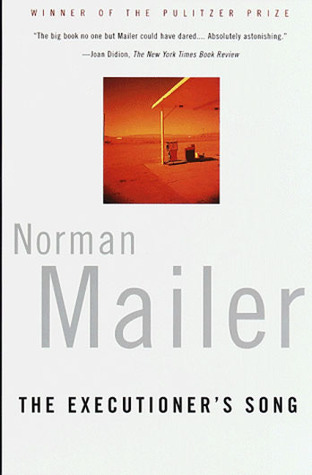The Executioner’s Song caught my eye at an airport bookstore, I knew nothing about it, as a matter of fact I thought this was going to be fiction. I knew and still know very little about the author Norman Mailer. The blurb on the back sold me on it immediately however, “I want to urge you with all my being that you must read The Executioner’s Song. I want to further guarantee that you will finish it. It’s the fastest 1,000 pages you will ever know.” - Dave Eggers
The fastest 1,000 pages I’ll ever know! Sounds like a deal to me. We are introduced to fresh out of jail Gary Gilmore and over the next 1,100 pages we are going to read a lot about this complicated, genius, poetic soul who is also a miserable, violent, rapist, murderer, racist, bigot who at the age of 30 something manipulates his 20 year old girlfriend to kill herself. But his IQ is so high and he writes poetry so it all evens out?
I say this often but morality is not my only focus as a reader, however, if you’re going to write about an unsympathetic or evil individual, you need to write it well. The first 300, maybe 400 pages are the best part of the book. Mainly because the book at this point is about Gary Gilmore. It’s a small story about a man who is unable to rehabilitate into society and slowly regresses into violence and thievery and all sorts of unsavory behavior. This as a character study works and the slow, removed narrator actually builds tension.
Which let me get into that. To Mailer’s credit, he writes concise, focused, tiny paragraphs that give the page so much room to breathe. I never felt overwhelmed by the amount of pages in this book because of how factual and detached Mailer was. I think his voice would work much better with three or four hundred pages and not a thousand.
So spoiler alert, Gary kills two Mormon young guys in cold blood. Now this book justifies its length by giving everyone in a one hundred miles radius of this story their own POV. We start with Gary, his girlfriend, Nicole, then their entire families, then his employers, then the lawyers, then the press, then the warden, then the ACLU, then the judges, then the church, then the typographer and the list goes on and on and on and on. There are so many thin characters in the book that I felt nauseous keeping up with all of the names until I gave up and stopped caring. The story wasn’t engaging enough to justify me taking notes.
Now this book is not irredeemable. It shines a light on a very interesting moral dilemma. Is the death penalty ethical? Is suicide ethical? What are the ethics then of a man begging for the death penalty? Is it his right to die? Is it the states right to kill? And there are some metaphysical topics that are of interest to me to. Dennis Boaz, Gilmore’s hippy synchronicity driven lawyer ends up being one of the more interesting characters here but he falls into the same trap as all of the other self-important vultures who wheel and deal all over Gilmore’s corpse which brings me to my largest complaint of this book.
If you thought this book was about Gary Gilmore, you are wrong. You are going to spend the last 700 pages reading about Larry Schiller, the grimiest, most determined little Hollywood leech on the planet. The book ceases to be about the execution of Gilmore and much more about how horny Schiller is to buy all of the rights to the story so he can make one of them there moving pictures! And if his character was written objectively, maybe I wouldn’t despise Larry Schiller but somehow a man who bought all of the rights to the story happens to be the protagonist of it. What are the odds?
I can’t believe I found myself rooting for an angry prison warden over this sleeze-bag who is abandoning his wife so he can bully, beg, and squeeze every dollar out of these families as he possibly can. He sneaks into prison under false pretense as Gary’s lawyer so he can interview Gary and is immediately caught for it and banned from the prison. Again, this by itself is interesting but since the book is biased, our Schiller is a hero for wanting this story and wasting the next 500 pages whining about his lack of access to Gary. He then sneaks interview questions to Gary’s lawyers and constanlty critcizes them for not interviewing him well enough.
This book is so completely pretentious, of such little substance, it is hollow inside and out. The core of the story is fascinating and a better author could make something with it but too many financial and egoic interests watered down the substance of this into the sprawling nothing that it is.
I swear you can slap a Pulitzer on a book and people will lose all critical thinking. I know it’s all subjective but how anyone can get through this and not disdain it is a wonder to me. Dave Eggers was wrong in the end, this was the slowest 1,000 pages I have ever known. This made Dostoevsky seem like a walk in the park.
Anyway, I’ll have more of these to come, hopefully the next one will be more positive. Have you read this? If so, do you have any thoughts? Am I full of it? Any books you’d reccomend? Let me know!



This reminded me of a pretty good movie, Ace in the Hole(1951). The main character would be familiar to Schiller.
Wikipedia's plot summary: `The story is a biting examination of the seedy relationship between the press, the news it reports and the manner in which it reports it.`